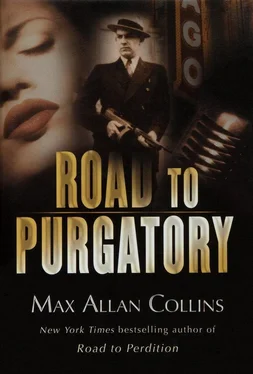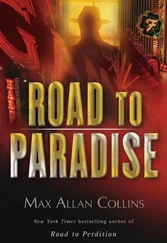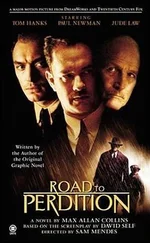When he read the papers, morning and evening alike, and certain distinctive words popped out at him — Guadalcanal, North Africa, Stalingrad — something gnawed at his gut. Gratifying as good news from the Solomon Islands might be, he was frustrated by the absence of Philippines coverage. The government continued to keep the lid on tight, particularly about how Uncle Sam had left behind the boys on Bataan... all except Michael Satariano and General MacArthur... to twist in an ill wind from the Far East.
But then he’d turn to the funnies, and force such thoughts out, making room for L’il Abner and Dick Tracy.
At night, between cool sheets in a bed big enough for a family of five, Michael would sometimes face sleeplessness. (“It’s the caffeine in those damn Cokes,” Campagna would say, advising, “You’d sleep like a baby, you drank beer.”) Coca-Cola notwithstanding, he slept better when Estelle lay beside him, breathing, beautiful, human, physical company.
But alone, often when he was just about asleep, faces from the past would drift through his consciousness... his father, patiently teaching him to drive on a country back road; his mother, serving a plate of corned beef and cabbage with a knowing smile (“I told you you’d grow to like it”); his brother’s gleeful laughter when Michael pushed him in the backyard swing; Connor Looney’s sick smile at the last Christmas gathering; grandfatherly John Looney tousling Michael’s hair; his father blasting away with a tommy gun; his mother and brother dead on the floor of their house; his father cut down from behind, by a Capone killer .
And he would go out on the balcony, even when it got cold, even when he had to kick snow aside, and he would stare at the abstract twinkling shapes that were the buildings of the city. And sometimes the edge of that railing seemed to call to him, inviting him to slip over and take the ride of twenty stories down to a bed where he could sleep undisturbed...
As the months went by, Michael did not hear from Eliot Ness. Nor did Lieutenant Drury make any effort to contact him. Perhaps the two men were embarrassed by the meager payoff of their raid on the Colony Club.
Shuttering Rush Street’s most popular nightspot did not make either man any friends, and the embarrassment suffered by captains of industry, politicians, and judges, ignominiously rounded up and shoved in the back of paddy wagons, translated into criticism and lack of support in high places for the gang-busting efforts of both men.
Shortly after the Town Hall interview with Ness, Michael received notification he was back on inactive duty; his little paychecks ceased. He was no longer a soldier in Uncle Sam’s army, rather a lieutenant in Frank Nitti’s.
Within the Outfit, Nitti’s decision to walk away from prostitution was generally accepted as a sound one. With the real houses shut down, Ness stooping to raid the Colony as a “brothel” (a stretch) showed the G-man’s desperation. And, at the same time, the boys still got their share from the girls — strip clubs and arcades were flourishing with serviceman trade — with the high-class hookers working out of hotels and apartments kicking back, as usual.
Michael was able to convince Frank Nitti that Estelle was loyal; that despite what Drury was claiming in the press — about the Colony’s third-floor housing wide-open cash-and-carry prostitution — Estelle had strictly used the favors of her 26 girls as a dividend for high rollers. That no charges were brought against her indicated she was telling the truth.
“If you vouch for her, kid,” Nitti had said, as they sat in a booth at the Capri, “that’s all I need.”
But the landscape was shifting, and in early 1943 the blessing of Frank Nitti did not always seem to be enough.
Though not privy to board meetings, Michael would get the lowdown from his friend Louie Campagna. On a peaceful return trip to Calumet City — where once a month Campagna and Michael strolled around, just to maintain in certain people the fear of God — Campagna had warned Michael that Estelle might well be in solid with Nitti, but other Outfit insiders suspected her.
“She’s straight, Louie,” Michael said, behind the wheel. “She’s a good kid.”
“She’s a ‘kid’ ten years older than you, Mike. And her old boyfriend Nicky Dean’s helping the feds, we think. Plus which, Ricca and some of the others don’t view her getting a free ride from the cops same way Frank does.”
“How so?”
Campagna, who was cleaning his fingernails with a pocket knife, said, “They think she got a pass ’cause she’s cooperating with the feds.”
Frowning, Michael said, “Louie — she got a pass because Drury couldn’t make that prostitution charge stick!”
“Yeah? What about the gambling?”
“She leased the second floor out to Sonny Goldstone, you know that.”
Campagna shrugged. “They coulda nailed her, if they wanted. Had her in for questioning half a dozen times.”
“I been questioned, you been questioned. That doesn’t make us rats.”
The stocky little hood put away the pocket knife, as the car rolled by a steel mill. “I know you like the broad. Who wouldn’t? But even if she’s as straight as you think—”
“She is.”
“Fine. But Ricca suspects her. And maybe you noticed, innocent till proved guilty don’t come up much, in our circle.”
From his position on the sidelines, right next to the game, Michael could easily sense the tensions. Though gradual, a certain physical deterioration on Nitti’s part was inescapable — the man was drinking more wine than milk these days, taking prescription pain medication for back pains relating to an old assassination attempt, and he’d lost weight, giving him a tired, sunken-cheeked look.
To Michael, however, the man seemed no less sharp; and his impeccable grooming, a point of pride for the one-time barber, kept him looking like the top executive he was. Often Nitti and Michael would have lunch together, sometimes joined by Campagna, sometimes not, and Nitti increasingly spoke of business in front of Michael.
Whose status as Nitti’s number-two man (after Campagna) was widely known now, and accepted. The story about Calumet City had reached legendary proportions, and his “rescue” of Capone from disloyal bodyguards — though only a rumor, never openly discussed — had inspired the resurrection, from the Medal of Honor press coverage, of the Demonio Angelico tag the Filipino Scouts had bestowed him. Spoken in front of Michael, a certain comic tone usually was present; but respect was there, too. Kidding on the square.
Michael, of course, had benefited from Nitti’s misreading of his assault at the Capone estate. But the young bodyguard, a novice to Outfit politics, could not foresee the ramifications facing Nitti himself; and by February, the breaking point approached.
In the white-and-gold presidential suite at the Bismarck, Nitti, tie loose, sat on the couch, stocking feet up on a coffee table, a glass of wine in hand. Campagna, Michael, and their boss had just returned from St. Hubert’s where treasurer Jake Guzik revealed overall earnings were up, despite the decreased prostitution revenue.
While Nitti relaxed, Campagna stewed, pacing behind the couch. This had been coming for weeks; even months. Campagna would bring the subject of Ricca up, and Nitti would bat it away. But today the putty-faced consigliere clearly would be heard.
Campagna finally lumbered around to plant himself before his seated master. “Frank, you gotta face this thing.”
Nitti’s eyes stared into nothing; the glass of wine in his hand was still. “What thing?”
“You know what thing. The Ricca thing.”
The tiniest of shrugs caused a bare ripple in the wine. “Nothing to face. Profits are up. We stand firm against these charges.”
Читать дальше












